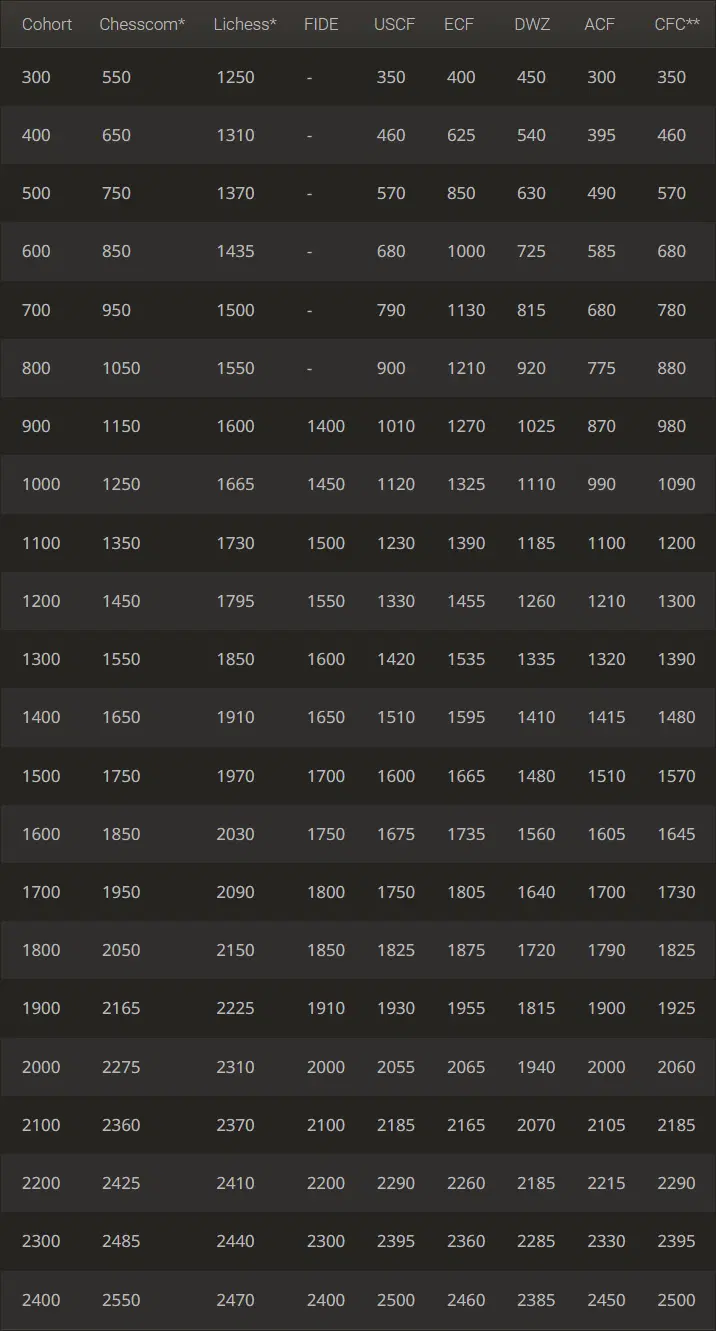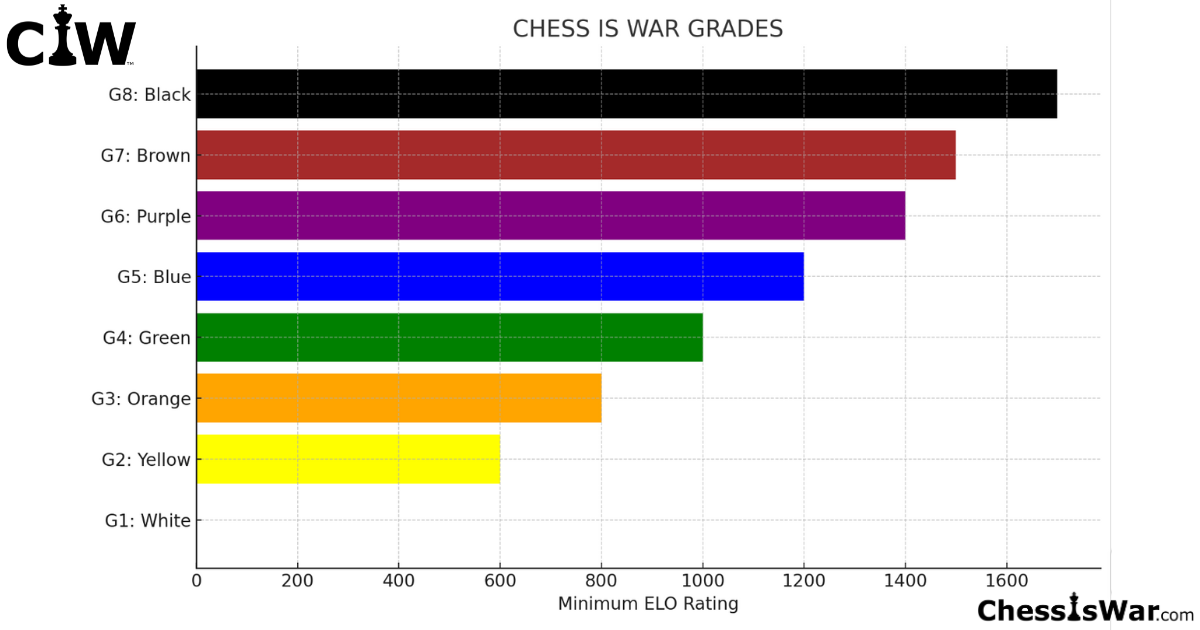♟️ CHESS IS WAR GRADES 🥋
| Grade | Belt Color | Chess.com Rapid | Percentile |
|---|---|---|---|
| GRADE 1 | WHITE | — | — |
| GRADE 2 | YELLOW | 600 | ⁓ 53.8% |
| GRADE 3 | ORANGE | 800 | ⁓ 71.3% |
| GRADE 4 | GREEN | 1000 | ⁓ 83.4% |
| GRADE 5 | BLUE | 1200 | ⁓ 91.3% |
| GRADE 6 | PURPLE | 1600 | ⁓ 97.8% |
| GRADE 7 | BROWN | 1800 | ⁓ 99.2% |
| GRADE 8 | BLACK (Ocho Meistro) | 2000 | ⁓ 99.8% |
Percentile: The percentage of Chess.com Rapid players with lower rating.
We use Chess.com Rapid rating as our benchmark since most chess games are played there, and we chose the Rapid format because it is the closest to Classical Chess time controls. REAL chess, not just fun dopamine rush style. 2000 Chess.com Rapid rating is also the most sought-after Chess “Title”.
Once you get a Grade/Belt, no one can remove it. Achieve that rating just once and you hold the grade for life. Let’s say, your rating decreases by 300 “Elo”, your grade will be detained anyway.
🥋 GRADE 8: BLACK BELT – OCHO MEISTRO (OM) aka Advanced Chess Warrior
When you reach GRADE 8: BLACK (minimum 2000 Chess.com Rapid rating), you’ve earned your Ocho (8 in Spanish) title. This means you’re not just a player — you’re an Advanced Chess Warrior, a tactician, and a serious threat on the board. You are in the 99.8% percentile, the Top 0.2% of all Chess.com players.
OM: Ocho Meistro
Ocho: 8 in Spanish. Grade 8 Black Belt.
Meistro: A person who defeats an enemy or opponent in a battle, game, or other competition.
Then at this level, 2000 Chess.com rapid rating, Dans for each 100 “ELO” points achieved.
Just like in the FIDE Classical Chess, a 2000 chess rating is enough to make you a Titled Player. Think about the 2000 ELO required to be a FIDE Woman Candidate Master (WCM).
🥋 From Black Belt to Dan Ranks
Once you reach GRADE 8, Ocho, the climb to excellence continues.
For every additional +100 “ELO” points, you earn a Dan Rank, just like in martial arts.
🧠 Example:
- 2100 rating = Black Belt, 1st Dan
- 2200 rating = Black Belt, 2nd Dan
- 2300 rating = Black Belt, 3rd Dan
- 2400 rating = Black Belt, 4th Dan
- … and so on
Each Dan Rank represents a new level of mental sharpness, experience, and psychological warfare.
1 Club, 4 Categories
| Category | Chess.com Rapid |
|---|---|
| Dabbler | 0 – 1199 |
| Intermediate | 1200 – 1599 |
| Advanced | 1600 – 1999 |
| Expert | 2000 and up |
For the chess rating convertion, I’ve used the only reliable tool available.
Chess Dojo Universal Rating Converter

** CFC data sources are a bit lacking, so please take those numbers with a grain of salt.
*** I cannot include every single classical rating system in this converter, but hopefully I have covered the majority of them.
The first column (Cohort) is the internal rating of Chessdojo.
| RATING | WHO / WHAT | NOTES / TITLE |
|---|---|---|
| 4043 | Stockfish 17 | Strongest chess engine in the world (est.) |
| 2882 | GM Magnus Carlsen (peak) | Peak FIDE rating (May 2014) |
| 2500+ | Grandmaster (GM) | FIDE title — requires norms and rating |
| 2400+ | International Master (IM) | FIDE title — lower than GM |
| 1200 | A good chess rating on Chess.com | Intermediate level / CIW Grade 5 Blue Belt |
| 620 | Average rating on Chess.com | Among casual/new players (mainly rapid/blitz) |
What is a Good Chess Rating?
♟️GRADE 2: YELLOW on the Chess Is War scale. 👍
If you’ve broken 700, congratulations! 700 rating is a nice achievement, you’re now above average.
The average Chess.com Rapid rating is 618.
You’re well into in the top half of all online Chess players in the world! You are better at Chess than millions of possible opponents! You’ve certainly worked on your game at this level. And you’re doing great!
♟️GRADE 5: BLUE on the Chess Is War scale. 👍
GM Hikaru Nakamura — widely considered the second-strongest player in the world after GM Magnus Carlsen — has said that 1200 is a solid target for new adult players. In a video, he recommends this rating goal to a 30-year-old beginner, explaining that 1200 represents a level well above complete beginners, yet remains achievable for casual players who are consistent.
He also notes that the average skill level in chess has risen significantly in recent years due to the widespread use of AI engines, YouTube, and online tools, making it easier to improve quickly. As a result, a 1200 rating today reflects stronger play than it did a decade ago.
1200 Chess rapid rating. Congratulations, you’re now better than 90% of Chess.com players. You’re not a Dabbler anymore, you’re an Intermediate Player.
Sturgeon’s law: 90% of everything is crap.
To quote some elitist scumbags on Chess forums.
For deeper knowledges about Chess Rating.
♟ Why Are Chess Ratings Different Everywhere?
Chess ratings aren’t universal — they vary depending on the platform or organization. While most systems are based on the Elo formula, the starting ratings, calculation methods, and player pools all differ.
For example, online platforms like Chess.com and Lichess attract casual players, while FIDE and USCF (which govern official over-the-board tournaments) have more serious, competitive environments. Naturally, your rating on each system will reflect those differences.
🧠 What Is Your “Real” Chess Rating?
Many new players want to know their “real” rating, but the truth is — there is no single, official rating that applies everywhere. Your Chess.com rating doesn’t directly convert into a FIDE or Lichess rating. Each system is self-contained.
Some people argue that online ratings matter less than over-the-board (OTB) ratings, but that’s debatable. Yes, online games come with unique factors like disconnections or distractions — but those same risks apply to both players. So your online rating still reflects your skill, just in a different context.
♟️ What Is Elo?
Elo is a rating system developed by Arpad Elo to calculate the relative skill levels of players in zero-sum games like chess.
It’s officially used by FIDE — the International Chess Federation — to rate players in over-the-board (OTB) tournaments.
🌍 FIDE Elo = The Official Standard
| System | Rating Name | Used For |
|---|---|---|
| FIDE | Elo | Real-world, rated tournaments |
- Starts at ~1000 Elo
- Must play in FIDE-rated tournaments to earn a FIDE rating
- Titles like FM, IM, GM are based on FIDE Elo
💻 Online Platforms Use Their Own Systems
| Platform | Rating System | Notes |
|---|---|---|
| Chess.com | Glicko (modified) | Separate ratings for Blitz, Rapid, Bullet, Puzzles |
| Lichess | Glicko-2 | Generally more inflated than Chess.com |
| Others (CT-ART, Chessable, etc.) | Custom/Training ratings | Not comparable to Elo |
These ratings look like Elo, but they are not FIDE Elo and use different math behind the scenes.
⚠️ Why the Confusion?
- All these systems use similar-looking numbers (e.g. 1500, 2000), but:
- You can be 1800 on Lichess
- But only 1500 FIDE
- Your online rating ≠ your real-world rating
FIDE Elo = real-world official chess rating
Chess.com / Lichess ratings = online-only, non-transferable, often inflated
🧩 Final Thought:
Your rating is only as “real” as the environment it represents. Whether online or over-the-board, what matters most is consistency, improvement, and the willingness to battle on the board — or the screen.
Personally, I use my Chess.com rapid chess rating as my “Elo“. And it’s probably the case for most serious chess players. Since, nowaday, everybody is online and Chess.com is the biggest and most popular chess website in the entire world.
PYGOD
Sources:
https://chessboxingnation.com/grades/
https://1500meisterblueprint.carrd.co/
https://www.chessdojo.club/material/ratings
https://chessgoals.com/rating-comparison/
https://www.chessdojo.club/blog/new-ratings/noseknowsall
https://www.chessboxingfrance.fr/ifc/
https://en.wikipedia.org/wiki/Chess_rating_system
https://chessmood.com/chess-study-plans
https://chessgrandmonkey.com/chess-rating/
https://www.houseofstaunton.com/chess-blog/elo-chess-rating-system/
https://chess-teacher.com/good-chess-rating/
https://www.chess.com/article/view/who-is-a-good-chess-player
https://www.chess.com/forum/view/general/chess-to-bjj-rankings-equivalent
https://www.chess.com/blog/mbk282/chess-elo-vs-the-bjj-belt-system-chess-vs-bjj-part-2
https://www.reddit.com/r/chess/comments/6ugnch/chessboxing_carlsen_vs_mayweather/
https://www.reddit.com/r/chess/comments/mqqbde/800_on_chesscom_is_not_beginner/
https://lichess.org/forum/lichess-feedback/lm-title-requirements
https://youtu.be/oSwjaRqKqYk?si=2pqsnmhT8YnJgBlD
https://youtu.be/ytuVPJivmHo?si=eYBhmKJZ8fWccI18

